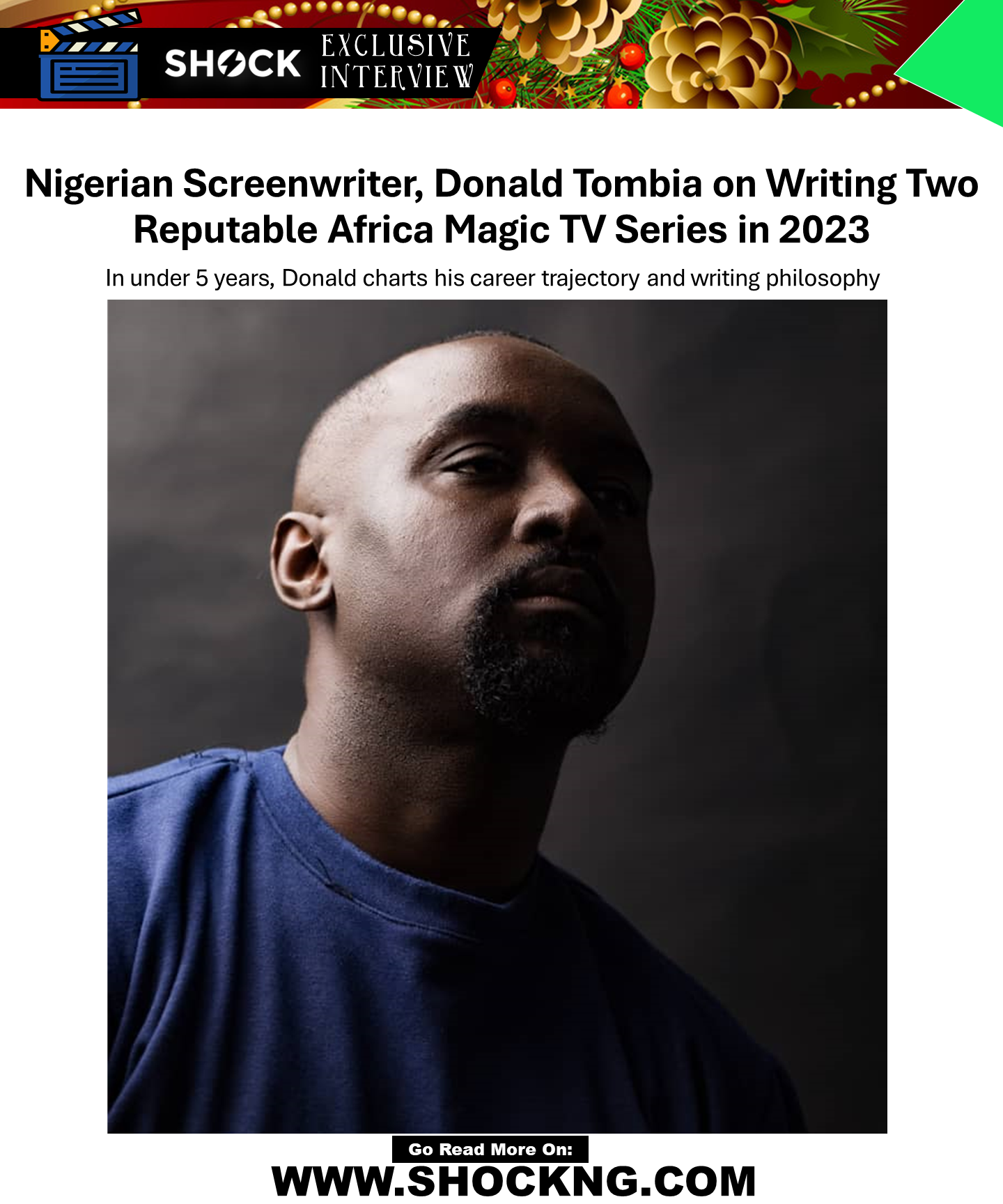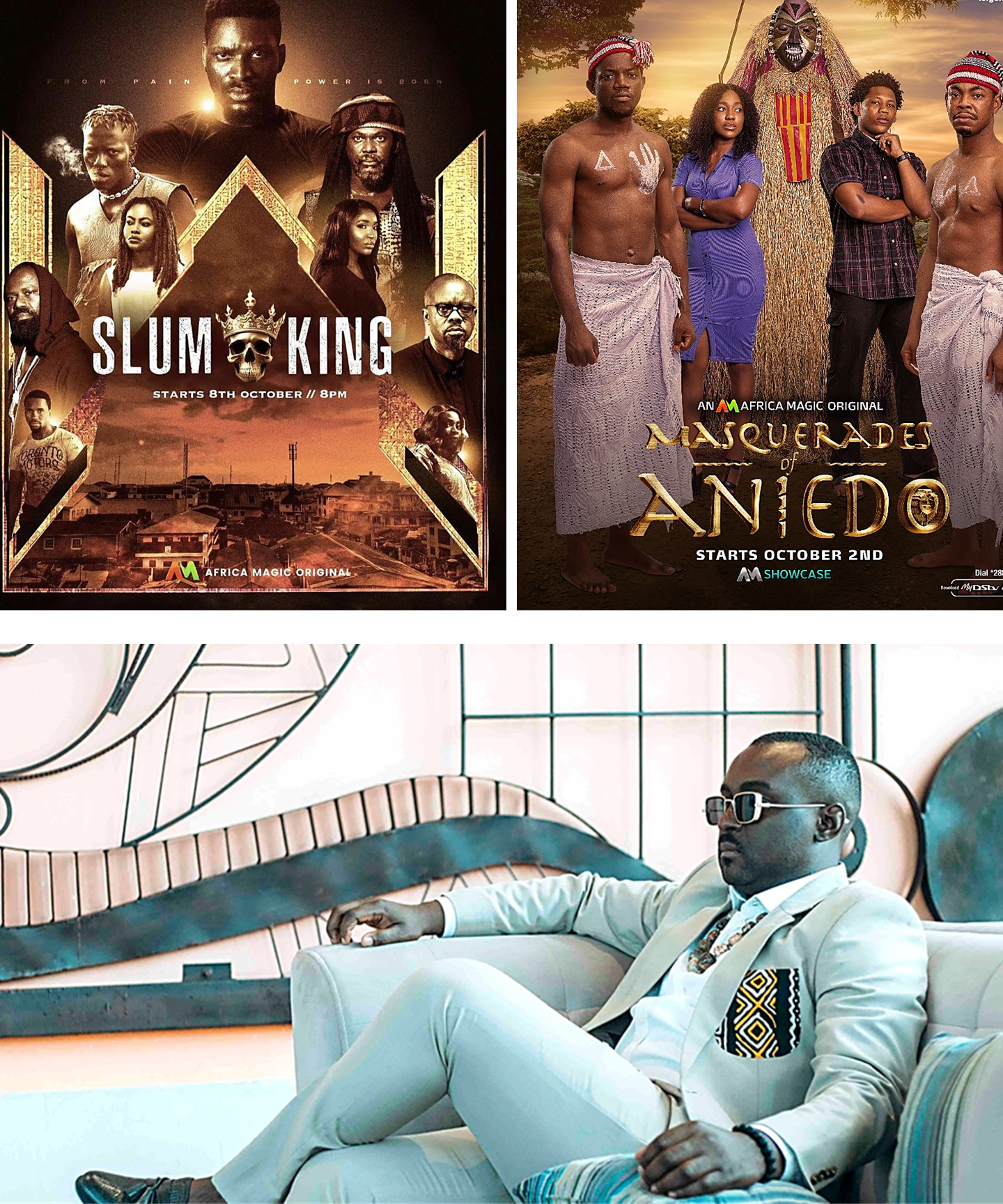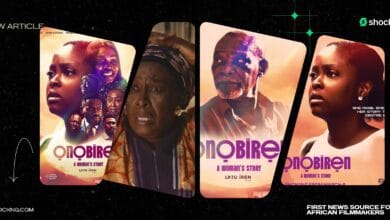The Story ⚡
Donald Tombia on working as Head Writer on two Africa Magic Original TV series in the same year.

Tell Me More
Award-winning filmmaker, Donald Tombia is Co-creator and Head Writer of Slum King and Head Writer of the 130-Episode Telenovela, Masquerades of Aniedo.
The filmmaker is the AMVCA8 Winner for Best Writer for Film and TV with Introducing the Kujus (2020). With the medical drama Strain (2020), he won Best Screenplay and Best International Movie at The African Film Festival and Urban Film Festival respectively.
Donald also co-wrote Shanty Town (2023), was Story Editor on Covenant (2023), Dilemma (2022), and Enakhe (2021), and was a writer on Tinsel (2019), and Ajoche (2018).
Donald sits with Shock in this exclusive interview and discusses his work philosophy, writing for the Nigerian audience, and how he was able to Head Write Africa Magic’s 2023 biggest TV series.
How did you pitch Masquerades of Aniedo?
Masquerades of Aniedo wasn’t one of the ideas I pitched. I got a message from Victor Sanchez Aghahowa asking if I was available to be Head Writer on a 130-episode show. At the time the title was an English title and it wasn’t set in an Igbo-speaking community.
He gave me a document with the idea and premise outlined. I developed it, gathered a team, then we went into story development. The team developed it a lot more and we built it to the way it ought to be. I was the Head Writer up until Episode 50, then I had to part ways with the Production Company because I had some conflicting commitments.
How did the process work for Slum King?
The process for Slum King was similar. Chichi Nworah had the premise mapped out when she reached out to me. She was excited about the idea of a boy in the slums who liked football, following his dreams albeit with forces warring against his ambitions. When we pitched a developed version to the Africa Magic, they loved it.
I then gathered the writing team of Ifeanyi Barbara Chidi as Story Editor, Fatimah Binta Gimsay as Script Editor, Stephanie Dadet as Researcher and Xavier Ighorodje.
In terms of Discipline as an African magic writer and writing scripts for sale, what’s the major difference?
Africa Magic has hacked the process for turning up quality work; the merge between creativity, control, and discipline. In Africa Magic you need structure. Everyone expects that when you do a soap opera like Tinsel, at 7:30 PM every day the next episode screens. There are no excuses.
So say your transmission date is 15th October. You reverse engineer. By that date, the show must have been shot, and gone through post-production and final review. This means the entire story development process must have begun long ago. If one person drops the ball, it affects the entire process.
Africa Magic by virtue of the grand things they’ve been doing for two decades, they have developed a system. For us storytellers who have worked with them, we have also taken up this structured system. I’m grateful for that because I take this same approach for other commercial work, especially film.
As a screenwriter, what are the fundamental things to know in screenwriting and film?
Self-belief first. Then in terms of skillset, the fundamental in both formats is storytelling, and the fundamental visual representation of the told story is a screenplay or script. So the real difference is in the techniques used. For instance, on TV, there’s more time to sit with characters. That’s a huge difference that decides what techniques to use.
Another difference that decides what techniques come in play is the time you have to tell your story. Is it a story where you have only 2 hours to captivate your audience? Or a story that will capture people in 60 hours. Factors like this lead to the different techniques employed. Same fundamentals of storytelling and screenplay, different techniques used in the storytelling and the writing of the screenplay.
How do you write something the Nigerian audience would love and how do you also write spectacle in a play?
First, the story determines what you’re doing. In the pilot of Slum King, the story needed some armed robbery/assassination plot to begin the tale. That was some spectacle but it was the story that allowed us to do that. Sometimes you see spectacle on screen for the sake of spectacle.
You watch a film and wonder why a scene was added. Beautiful to look at but doesn’t advance the story. When you add spectacle in film or TV, it needs to advance the story.
Storytelling is universal and powerful. Stories are about people who are doing things in places. The place is important. Stories must be cultural because you’re telling a story about a people. If I’m telling a story about Nigerians, there are things I need to take into cognizance.
Sometimes when we tell our stories, we do not make an emphasis on the culture of the people we’re telling the story about. Unless your story is about an outlier, then you need to write culture into your film.
Another aspect is the style of storytelling we use here. A lot of us grew up with Western storytelling which has a particular format to it. And that is most recognizable in most parts of the world. However, there are some other types of stories gaining mainstream attention like K-dramas, and they pay a lot of attention to their culture. You watch it and leave having a sense of what their culture is about.
I had 4 key things I wanted for Masquerade of Aniedo as an Igbo story. I needed the story to be so simple my grandmother and a sophisticated Harvard professor could both understand it. I needed it to have heart so it thaws at your emotions. I needed tension not just conflict. And I needed Masquerades of Aniedo to be so cultural that if it needed to be adapted to another culture, it would almost have to be entirely reworked.
Do you think Nollywood is ready for the investments it’s been getting?
More money is always good. It’s the use of the money we should talk about. There are stages to delivering your final product to your consumers and till date, the money infusion is not evenly distributed.
Granted, it would be tough to achieve equality of financial spread but if the money doesn’t stop in just the technical aspects of film or TV but cascades down to the creative aspects as well, then the entire Nollywood is uplifted. More money is always welcome but it’s the utilization of the money that’s the next phase we need to turn our attention to.




